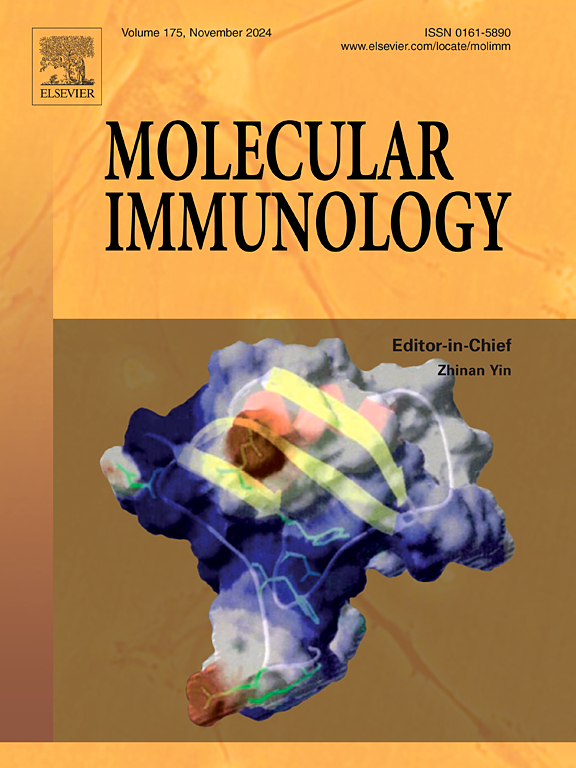Genetics and humoral responses of the immune system to Aspergillus fumigatus
IF 3
3区 医学
Q2 BIOCHEMISTRY & MOLECULAR BIOLOGY
引用次数: 0
Abstract
Due to the increasing incidence of invasive aspergillosis (IA) caused by the opportunistic fungal pathogen Aspergillus fumigatus, coupled with rising antifungal resistance and high mortality rates globally, novel antifungal development is a critical priority for reducing disease burden. The opportunistic fungus Aspergillus fumigatus, prevalent in the environment alongside other fungi, infects immunocompromised individuals with weakened immune systems. The pathogen can cause severe diseases with fatal outcomes. Risk factors contributing to the severity of A. fumigatus-associated diseases have been identified, and the efficacy and molecular targets of antifungal drugs have been documented. Here, we describe specific interactions between the human immune system and the airborne pathogen A. fumigatus, emphasizing how co-infections influence virulence and disease progression. We reported A. fumigatus cell wall components, such as β-glucans, that mediate interactions with the host immune system, acting as virulence factors driving significant morbidity and mortality. We also discovered compounds, biomarkers, and non-coding RNAs with potential for immunotherapy, suitable for applications in targeted antifungal therapy, vaccine development, and diagnostics..
免疫系统对烟曲霉的遗传和体液反应
由于机会性真菌病原体烟曲霉(Aspergillus fumigatus)引起的侵袭性曲霉病(IA)发病率不断上升,加上全球抗真菌耐药性上升和死亡率高,开发新型抗真菌药物是减轻疾病负担的关键优先事项。机会性真菌烟曲霉与其他真菌一起普遍存在于环境中,感染免疫系统较弱的免疫功能低下的个体。这种病原体可以引起严重的疾病,造成致命的后果。导致烟曲霉相关疾病严重程度的危险因素已被确定,抗真菌药物的疗效和分子靶点已被记录。在这里,我们描述了人体免疫系统和空气传播的烟状芽胞杆菌之间的特定相互作用,强调了共同感染如何影响毒力和疾病进展。我们报道了烟曲霉细胞壁成分,如β-葡聚糖,介导与宿主免疫系统的相互作用,作为毒力因素导致显著的发病率和死亡率。我们还发现了具有免疫治疗潜力的化合物、生物标志物和非编码rna,适用于靶向抗真菌治疗、疫苗开发和诊断。
本文章由计算机程序翻译,如有差异,请以英文原文为准。
求助全文
约1分钟内获得全文
求助全文
来源期刊

Molecular immunology
医学-免疫学
CiteScore
6.90
自引率
2.80%
发文量
324
审稿时长
50 days
期刊介绍:
Molecular Immunology publishes original articles, reviews and commentaries on all areas of immunology, with a particular focus on description of cellular, biochemical or genetic mechanisms underlying immunological phenomena. Studies on all model organisms, from invertebrates to humans, are suitable. Examples include, but are not restricted to:
Infection, autoimmunity, transplantation, immunodeficiencies, inflammation and tumor immunology
Mechanisms of induction, regulation and termination of innate and adaptive immunity
Intercellular communication, cooperation and regulation
Intracellular mechanisms of immunity (endocytosis, protein trafficking, pathogen recognition, antigen presentation, etc)
Mechanisms of action of the cells and molecules of the immune system
Structural analysis
Development of the immune system
Comparative immunology and evolution of the immune system
"Omics" studies and bioinformatics
Vaccines, biotechnology and therapeutic manipulation of the immune system (therapeutic antibodies, cytokines, cellular therapies, etc)
Technical developments.
 求助内容:
求助内容: 应助结果提醒方式:
应助结果提醒方式:


